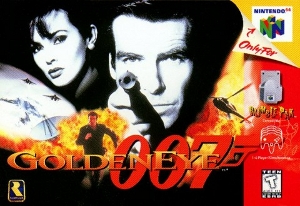
GoldenEye 007 is a 1997 first-person shooter video game developed by Rare and published by Nintendo for the Nintendo 64. Based on the 1995 James Bond film GoldenEye, the player controls the secret agent James Bond to prevent a criminal syndicate from using a satellite weapon. They navigate a series of levels to complete objectives, such as recovering or destroying objects, while shooting enemies. In a multiplayer mode, up to four players compete in several deathmatch scenarios via split-screen.

Columns is a match-three puzzle video game released by Jay Geertsen in 1989. Designed for the 68000-based HP 9000 running HP-UX, it was ported to Mac and DOS before being released commercially by Sega who ported it to arcades and then to several Sega consoles. The game was subsequently ported to other home computer platforms, including the Atari ST.
The fifth generation era refers to computer and video games, video game consoles, and handheld gaming consoles dating from approximately October 4, 1993, to March 23, 2006. For home consoles, the best-selling console was the Sony PlayStation, followed by the Nintendo 64, and then the Sega Saturn. The PlayStation also had a redesigned version, the PSone, which was launched on July 7, 2000.
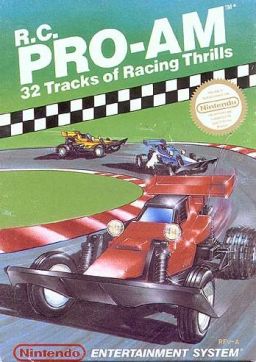
R.C. Pro-Am is a racing video game developed by Rare and published by Nintendo for the Nintendo Entertainment System. It was released in North America in February 1988, and then in Europe on April 15. Presented in an overhead isometric perspective, a single player races a radio-controlled car around a series of tracks in vehicular combat. Each track qualifies its top three racers for the next track. Collectible power-up items improve performance, hazards include rain puddles and oil slicks, and missiles and bombs can temporarily disable opponents. Originally titled Pro Am Racing, it was ported to the Sega Genesis in 1992 as Championship Pro-Am, an enhanced remake with enhanced graphics and additional features. R.C. Pro-Am spawned two sequels: Super R.C. Pro-Am in 1991, and R.C. Pro-Am II in 1992.

Cruis'n USA is an arcade racing game originally released in 1994. It was developed by Eugene Jarvis' company TV Games Inc., and manufactured by Midway Games. It is the first game in the Cruis'n series and features races set in locations across the continental United States.
Newsfield Publications Ltd was a British magazine publisher during the 1980s and early 1990s.
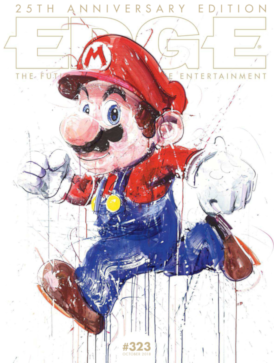
Edge is a multi-format video game magazine published by Future plc. It is a UK-based magazine and publishes 13 issues annually. The magazine was launched by Steve Jarratt. It has also released foreign editions in Australia, Brazil, France, Germany, Italy, and Spain.

Next Generation was a US video game magazine that was published by Imagine Media. It was affiliated to and shared editorial with the UK's Edge magazine. Next Generation ran from January 1995 until January 2002. It was published by Jonathan Simpson-Bint and edited by Neil West. Other editors included Chris Charla, Tom Russo, and Blake Fischer.

Snake Rattle 'n' Roll is a platform video game developed by Rare. It was published by Nintendo and released for the Nintendo Entertainment System in North America in July 1990 and in Europe on March 27, 1991. The game features two snakes, Rattle and Roll, as they make their way through eleven 3D isometric levels. A Mega Drive version was released by Sega in June 1993 with an extra level. Snake Rattle 'n' Roll was developed by Rare members Tim Stamper and Mark Betteridge. The music was composed by David Wise and was inspired by "Shake, Rattle and Roll" and other 1950s-era songs.

Impossible Mission is a video game originally written for the Commodore 64 by Dennis Caswell and published by Epyx in 1984. The game features a variety of gameplay mechanics from platform and adventure games, and includes digitized speech. Impossible Mission, which casts the player in the role of a secret agent infiltrating an enemy stronghold, is widely considered one of the best games for several platforms.
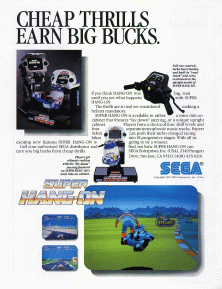
Super Hang-On is a motorcycle racing arcade video game released by Sega as the sequel to Hang-On. It uses a simulated motorcycle arcade cabinet, like the original game. An updated version was released in arcades 1991 as Limited Edition Hang-On.

Hyper was a multi-platform Australian video game magazine. It was Australia's longest running gaming magazine, published from 1993 to 2019.

Future US, Inc. is an American media corporation specializing in targeted magazines and websites in the video games, music, and technology markets. Headquartered in New York City, the corporation has offices in: Alexandria, Virginia; Minneapolis, Minnesota; and Washington, D.C. Future US is owned by parent company, Future plc, a specialist media company based in Bath, Somerset, England.

Julian "Jaz" Rignall is a writer and editor. He has also produced content for corporate websites such as GamePro Media, publisher of GamePro magazine and GamePro.com, marketing collateral and advertising campaigns.
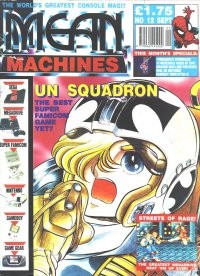
Mean Machines was a multi-format video game magazine published between 1990 and 1992 in the United Kingdom.

Mega was a British monthly magazine that covered the Mega Drive video game console. During its time as one of the main Mega Drive publications, Mega covered the "golden age" of the Sega Mega Drive from 1992 to 1995. The magazine went through many changes including a re-design in content and layout before being sold to a rival publisher.

Sega Power, initially known as S: The Sega Magazine, was a Future publication aimed at the Sega range of consoles, including the Master System, Mega Drive, Game Gear and later on the Mega-CD, 32X and Saturn. The magazine was later relaunched as Saturn Power when the other Sega consoles were discontinued.
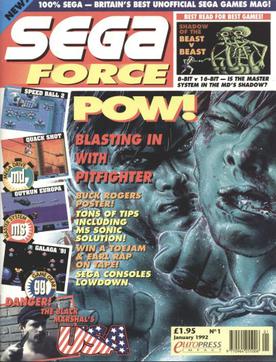
Sega Force was an early 1990s publication that covered the Sega console range.

Paragon Publishing Ltd was a magazine publisher in the UK, which published computer games and other entertainment titles from 1991 to 2003.

Bubsy in: Claws Encounters of the Furred Kind, often shortened to Bubsy, is a platform game first released for the Sega Genesis and Super Nintendo Entertainment System by Accolade in 1993. It is the first entry in the Bubsy series of video games. The game's title is a play on words in reference to the film Close Encounters of the Third Kind, with the game revolving around Bubsy defending the planet's supply of yarn balls from alien invaders.
















